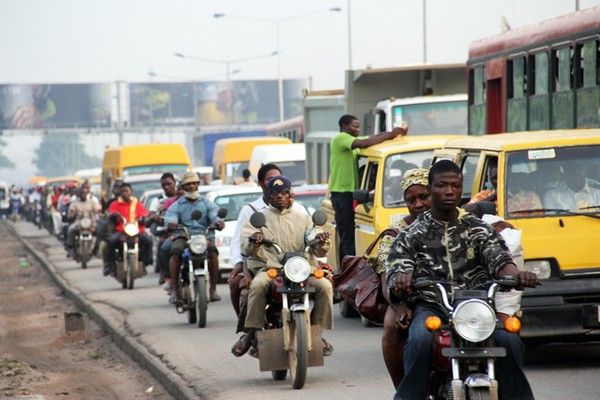CUTS International Accra – a leading public policy, advocacy and consumer protection organisation, in collaboration with the National Road Safety Authority (NRSA) and other road transport sector stakeholders, have engaged with motor riders – popularly called ‘Okada’ riders and all road user to strictly adhere to road safety measures to reduce road accidents during the Christmas festivities.
Addressing them at a town hall meeting in Accra, The West African Regional Director, Mr. Appiah Kusi Adomako, underscored the need for effective collaboration among all stakeholders to help deal with the triggers of road crashes among motor riders.
“The CUTS International is a research policy think tank, and we have realised that over the last 10 years there has been an increase in the use of motorcycles in the city of Accra, and this has also resulted in a lot of casualties on the road. We need to tackle this well to save lives,” he said.
Mr. Adomako added that while it was difficult to do away with the use of motorbikes because of the way the city had been planned, it was important to create a safer environment for them to move about.
“We condemn them without understanding them. Sometimes, their services become so invaluable that we need them. We should not be hailing them when we need them and condemn them when we do not need them,” he said.
In a presentation, the Director – Planning and Programmes at the NRSA, Daniel H.Wuaku, said the intensification of education for motorcycle riders was crucial as records at the authority had shown that 98 percent of motorbike users suffered injuries during accidents.
Mr. Wuaku said the increasing use of motorcycles in the country had been motivated by rising urbanisation, unregulated motorcycles usage, relatively cheaper cost of motorcycles and reduced mobility because of traffic congestion.
He noted that although the use of motorcycles had helped to fill a gap in the transport space, the increasing spate of crashes and fatalities involving motorbikes, coupled with environmental pollution and traffic management issues, were of grave concern.
The Director of Education, Research and Training at the Motor Traffic and Transport Division (MTTD) of the Ghana Police Service, Chief Supt Alexander Obeng, explained that the introduction of the Police Action against Rider Indiscipline (PAARI) by the police, for example, was yielding good fruits as issues of indiscipline among motorcycle riders had started reducing.
“They work with digital camera and scanners to gather evidence on the activities of motorcycle users,” he said. He urged motorbike riders to adhere strictly to traffic regulations, especially as the Christmas season approached.
He said the Police Administration had deployed designated officers under the PAARI initiative to enforce discipline among motorcycle riders at targetted hotspots for road crashes in Accra and other parts of the country.
For his part, the Public Relations Officer of the Ghana Motor Riders Association, Pascal Sitsoafia Quarshie, called on members of the public to stop the negative perceptions they had about motor riders.
He said instead of condemning them, efforts should rather be made to mainstream motor riding into the country’s transport system.
…Rallies support for BAC Revision
In another development, it is rallying key road safety stakeholders to join the advocacy to support government efforts, through the Ministry of Transport and other state road agencies to revise the Road Traffic Act, 2004 (Act 683), particularly the Blood Alcohol Concentration (BAC) levels, to conform with World Health Organisation (WHO) standards and reduce drink driving road crashes during Christmas.
At a town hall meeting organised by the National Road Safety Authority (NRSA) in collaboration with CUTS, Street Sense, Ghana Police Service and Driver Vehicle License Authority (DVLA) in Accra, the West African Regional Director for CUTS International, Mr. Appiah Kusi Adomako, said drink-driving is a major cause of road accidents in the country and evidence has shown that the risk of a fatal accident occurring under the influence of alcohol increases significantly at 0.08 mg/ml BAC level and above.
“At this level, all drivers and riders are said to be impaired regarding driving performance. As such, most countries across the globe have revised their BAC limit from 0.08 mg/ml to 0.05 mg/ml to conform with WHO standards, hence, the campaign,” he explained.
Mr. Adomako explained that the behavioural consequences associated with alcohol intoxication included impaired driving, leading to road accidents and acts of aggression and violence toward self and others.
“Being aware that the government, through the Ministry of Transport (MOT), has started the process of revising the blood alcohol content limit from the current 0.008 mg/ml to 0.005 mg/ml as a way of reducing accidents on the road occasioned by drunk-driving and conform with the World Health Organisation (WHO) standard, we support the initiative,” he added.
Mr. Adomako disclosed that so far, his outfit has the support of Ghana Online Driver Union (Uber, Yango and Bolt Drivers’ union), Ghana Driver & Road Safety Awards, Beverage Consumers & Bar Owners Association, National Motor Riders Association, the Media, CSOs Platform on Road Safety.
On his part, the Communication and Advocacy lead for CUTS, Mr. Shadrack Nii Yarboi Yartey, is urging all stakeholders, including drivers’ union, motorist, civil society organisation and Parliament to support the BAC amendment process. He advised Ghanaians to be cautious during the festivities and be moderate in their consumption of alcohol.
CUTS, with support from the National Road Safety Partnership, is advocating for the revision of Ghana’s Blood Alcohol Concentration (BAC) level from 0.08mg/ml to 0.05mg/ml.










